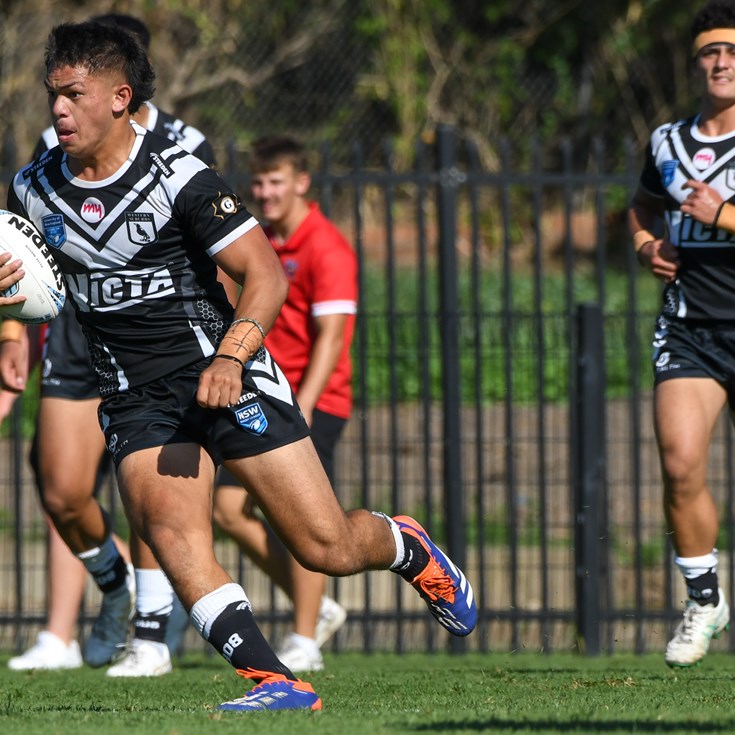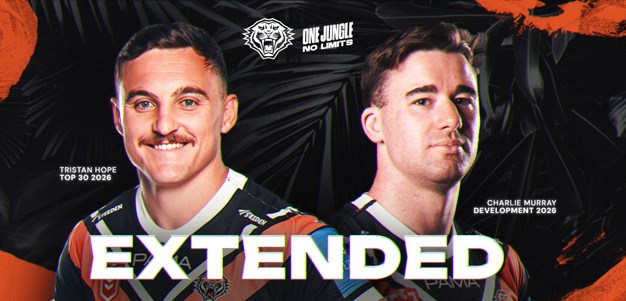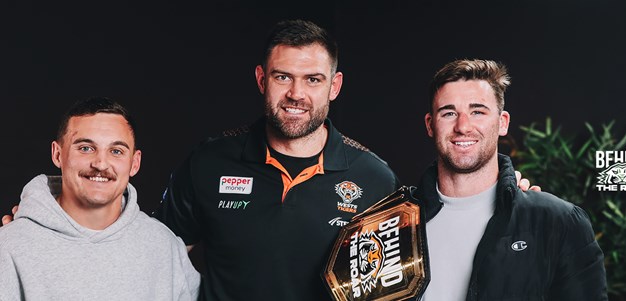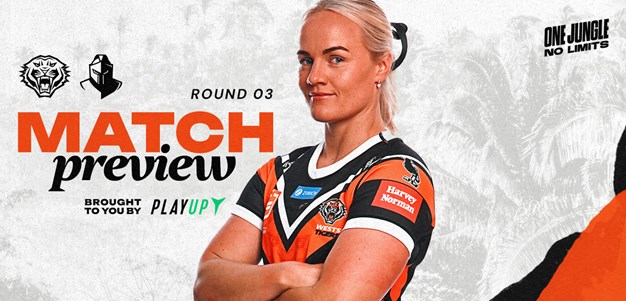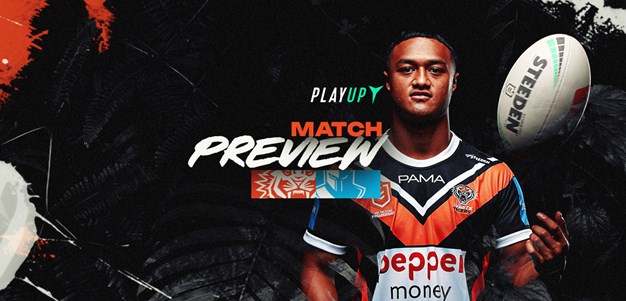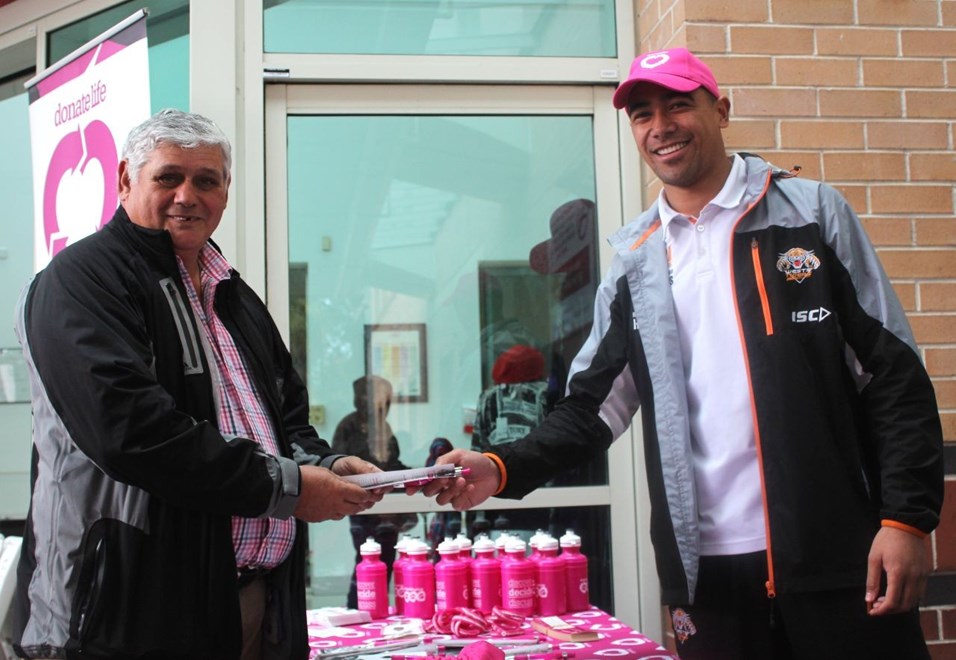

Wests Tigers are proud to be supporting DonateLife Week, with players taking part in a special event at Liverpool Hospital.
Wests Tigers Holden Cup players Veiru Mapesone and Roman Ioelu spent time at Liverpool Hospital on Thursday, spreading the word about the importance of organ donation.
DonateLife week runs from Sunday 31 July until Sunday 7 August and educates the public on the life saving role that organ donation plays.
Sorting the facts from the fiction about organ and tissue donation is vital to ensuring families consent to organ donation, and people continue to receive life-saving transplants.
SWSLHD Intensivist Dr Michael Parr said DonateLife Week (Sunday 31 July - Sunday 7 August) is a timely reminder to help save a life and to sort out the facts from fiction.
“Myths and misconceptions about donation and transplantation may be deterring some people from registering as an organ and tissue donor,” Dr Parr said.
“Unfortunately, myths about organ donation continue to confuse potential donors. Misconceptions such as celebrities getting a priority organ donation or not being saved in an emergency situation if you’re an organ donor are two examples that are blatantly untrue.”
“Our first priority is to save your life. Only after all efforts have been exhausted does organ donation become an option. The doctors and nurses trying to save your life are completely different from the recovery and transplant team,” he said.
Although three out of four people would say yes to receive a lifesaving transplant, only 56 percent of people are registered as donors. With more than 1,600 Australians on transplant waiting lists, Dr Parr said there’s never been a better time to chat with your loved ones.
“Even if you have registered your decision to be a donor, your family will still be asked to give consent, families that have discussed and know each other’s donation decisions are much more likely to support donation.”
There were around 75,000 deaths in hospital last year, only about 800 of those people were potentially able to become donors, and only 435 actually became donors which enabled just over 1,200 transplant surgeries1.
Since 2014 there has been a 42 per cent increase in multi-organ and tissue donation in south western Sydney. Although there's been some great success, Dr Parr said more can be done to increase organ donations.
“We are working hard to increase the number of life saving transplants for seriously ill patients. Since 2014 there has been a 50 percent increase in totally consents with every person registering to become an organ and tissue donor bringing us one step closer to achieving our goal of saving more lives.”
“One donor can make a big difference to those in need. Cornea donors give the gift of sight to two people. Skin donors help burn victims recover from traumatic injuries and bone marrow donors help plenty of people return to good health,” he said.
Myth busting
Myth: Doctors won’t work as hard to save my life if they know I’m a donor.
Truth: Our first priority is to save your life. Only after all efforts have been exhausted and you have been legally declared dead does organ donation become an option. In most cases, a person may only be able to donate organs where they have been declared brain dead in an intensive care unit in hospital. Brain death is completely different from coma. Brain death is when blood circulation to the brain ceases, and the brain stops functioning and dies with no possibility of recovery. Organ donation may also be possible after a person’s heart has stopped beating, commonly referred to as donation after circulatory death. The doctors and nurses trying to save your life are completely different from the recovery and transplant teams.
Myth: Celebrities and wealthy people on the donation waiting list get priority for receiving an organ transplant.
Truth: Factors such as race, gender, age, income or social status are not factored in when determining level of importance. A system is in place to ensure that the person offered the transplant first is the best possible match. The match is determined by severity of your illness, time spent waiting, blood type and other important medical information.
Myth: Organ and tissue donors cannot have an open casket funeral.
Truth: Funeral arrangements, including an open casket, will not be affected by the decision to donate. The removal of organs and tissue is no different from any other surgical operation. The donation of organs and tissues does not alter the physical appearance of the body and additionally, donation does not delay funeral services.
Myth: My religion does not support organ & tissue.
Truth: Most religions support organ and tissue donation as generous acts that benefit people. Donation is supported by Roman Catholicism, Protestantism, Judaism, Hinduism, Islam, Buddhism and other religions; it is seen by many as a final act of generosity. If you are unsure or have any questions, please speak to your religious leader.
Ready to help?
Firstly, the best way to support organ and tissue donation is to firstly discover the facts about organ and tissue donation here www.donatelife.gov.au/myths-and-misconceptions, register your decision online at www.donorregister.gov.au and discuss the decision with your loved ones. For more information visit www.donatelife.gov.au
